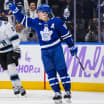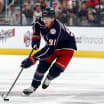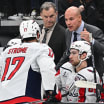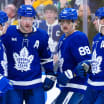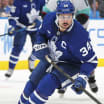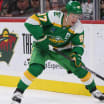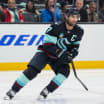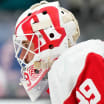Of course, Gordie Howe never really retired from hockey.
Not in 1971, when the forward hung up his skates for the first time following 25 years with the Detroit Red Wings.
And not in 1980, seven years after he returned to the ice with the World Hockey Association's Houston Aeros to play with his sons, Mark and Marty, a return that continued with the WHA's New England Whalers before spanning the bridge back into the NHL with the 1979-80 Hartford Whalers.
Gordie Howe transcended hockey long after playing career ended
Remained as face of NHL for decades following retirement announcement on June 4, 1980
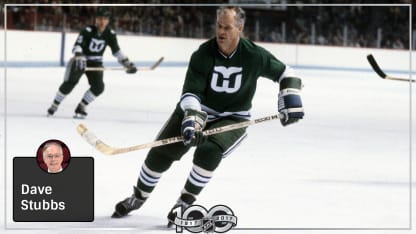
After more than three decades in hockey, Mr. Hockey took off his jersey and simply got busier, forever in demand as one of the greatest players -- to some, the greatest - to lace up a pair of skates.
In endless personal appearances from one North American coast to the other and far beyond this continent, whether speaking to captains of industry or handing out medals at minor-hockey banquets, or simply walking down the street and playfully nudging his iconic elbow into the ribs of an unsuspecting fan, Howe was for many the face, even the very essence of the NHL.
\[RELATED: THIS DATE IN HISTORY: HOWE RETIRES\]
Mr. Hockey retired as a player for the final time on June 4, 1980, though even at age 52 he figured there was still fuel in his tank - just not enough of it.
"I still think I'm [darned] good enough to play," Howe said in a retirement announcement that some believed they'd never hear. "But I'd hate to go out after 32 years and find out in the middle of the winter that I'd run short."
Spanning five decades, Howe skated into the sunset as the NHL's all-time leader in games played (1,767), goals (801), assists (1,049) and points (1,850). He also had 508 points (174 goals, 334 assists) in 419 WHA games.
He surely also was near the top of the unofficial category of sending opponents to the clinic for stitching up, Howe's enormous strength and suffer-no-fools style of play making him a rugged, fearless competitor who took his remarkable natural talents and polished them to a high gloss.
Indeed, his athletic ability was such that he could have starred at virtually any sport he'd have chosen. The NHL and countless fans were lucky the native of Floral, Saskatchewan, grew up in Saskatoon focused on hockey.
Howe's final NHL season was one of soaring achievement, as was every season in some fashion. The 1980 All-Star Game, played during the inaugural season of Detroit's Joe Louis Arena, saw Scotty Bowman add Howe to the Prince of Wales Conference roster as a coach's selection.
It was more a recognition of Mr. Hockey's body of work than his statistics in what would be his final season, and it was a brilliant sentimental choice. Though he was closing in on his 52nd birthday, Howe was having a season that would be respectable for players young enough to be his grandchildren; he finished 1979-80 with 41 points (15 goals, 26 assists) in 80 games.
"[Bowman] took some heat for the choice, but he stuck to his guns," Howe wrote in his 2014 autobiography, "Mr. Hockey Gordie Howe: My Story."
"I can still remember the announcer calling the lineups that night. When my turn came around, he just called out 'Number 9.' The standing ovation from the crowd for my 23th All-Star Game seemed to last forever.
"If Detroit fans consider you to be one of their own, they'll stick with you through thick and thin. It didn't matter that my hair was gray and I was playing for the Whalers. To them I was still Gordie Howe of the Detroit Red Wings. Standing on the ice that night was one of the great moments I enjoyed in the game of hockey and also one of the best feelings I've ever had in my life."
Howe's durability was incredible, given the pounding he took, and gave, on the ice. He missed 20 games in 1948-49 with a knee injury, his only significant stretch on the sidelines. In a Stanley Cup Playoff game in 1950, he collided with Toronto Maple Leafs center Ted Kennedy and fell sickeningly to the ice; Howe was removed from the ice on a stretcher and had surgery to relieve pressure on his brain. But he was out of the hospital in time to watch his team lift the 1950 Stanley Cup, then won the NHL scoring title the following season.
"By the time I hung up my skates for good, I'd just finished my 32nd season of professional hockey," Howe wrote. "I was 52 years old. When I say it out loud, it almost seems unreal that I played in five different decades. At the time, however, it felt completely natural. When winter arrived, it always just felt like time to put on my skates. It didn't matter whether I was a kid or a grandfather, those feelings didn't change."
Throughout his NHL and WHA career, Howe was assessed 2,084 minutes in penalties, "a handful of which I probably even deserved," he joked. That's the equivalent of almost 35 full games spent in the penalty box, a price he gladly paid to remind any and all it was a foolish thing to mess with Mr. Hockey.
"My career, though, feels like much more than a collection of numbers," Howe wrote. "It's playing for the fans and my teammates, and all of the friendships [my wife] Colleen and I made over the years. It's being part of something bigger than just myself. It's being on the ice, sweating and bleeding with the boys. It's the wonderful life that hockey allowed me to give my family. It's a game I love."
After a lengthy illness, Gordie Howe died on June 10, 2016, 36 years and six days after his second and final retirement as a player. To this day, many still speak of Mr. Hockey in the present tense, a fitting tribute for a timeless, ageless man who transcended his sport.
